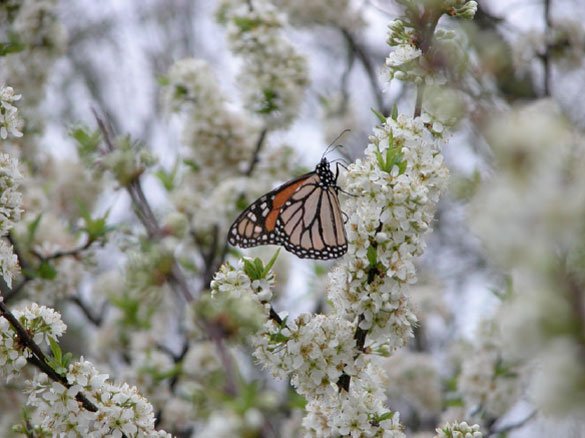prairie notes #17: Where the Wild Things Are
Prairie Notes are monthly photo/journal observations from Tandy Hills Natural Area by Founder/Director, Don Young. They include field reports, flora and fauna sightings, and more, mixed with a scoop of dry humor and a bit of philosophy. They are available free to all who get on the FOTHNA email list.
Where the Wild Things Are
Prairie Notes #17
March 23, 2008
Greetings from Tandy Hills Natural Area-
One by one, the flowering plants of Tandy Hills Natural Area, are taking their turn in the Spring spotlight. Trout Lily flowers have yielded to Creek Plum, a large colony of which can be found along the main trail. Monarchs and other butterflies were swirling around the plants in ecstasy when I took these photos. Puccoon, Purple Paintbrush and a host of other rare species are shyly waiting in the wings, waiting for the earth to warm a bit more. As you can see from the bottom two photos, when it does warm up, the results are striking.
THNA received a visit from a hungry looking coyote last week and he/she wasn't the least bit shy. (see center photo) This one was casually patrolling near View Street at 5:30 pm. Although we like sharing Tandy Hills with wildlife, care must be taken to protect them and us. Please see the enclosed attachments on how best to do that in urban areas.
Speaking of where the wild things are...
Prairie Fest 3 is just 34 days away on April 26, 2008. Come dance barefoot on the prairie while you help us save some of it. Our solar powered stage makes Brave Combo sound way better. Please help us spread the word about the greenest of the green festivals. Sponsor and Exhibitor info is available at the website. DEADLINE is April 7. Come to the meadow, where the therapy is always free.
Solving Urban Wildlife Problems
These 10 simple guidelines can prevent the most common urban wildlife problems:
Don’t leave cat or dog food outside overnight.
Don’t leave birdseed in feeders or on the ground overnight.
Don’t put unsecured garbage outside at night.
Cover crawlspace and attic openings with heavy gauge, rustproof wire mesh (not chicken wire).
Carefully inspect your eaves and other areas where the roof and house join.
Repair deteriorating boards, warped siding and loose shingles.
Trim overhanging branches that provide easy access to your roof for squirrels and other wildlife.
If you have a pet door, close it at night by sliding a template in place to cover the entrance.
If you have a chimney, make sure that it has a secure cap. Chimneys without caps are open invitations to raccoons looking for "hollow trees" in which to give birth and raise their young.
If you have a deck, you can prevent animals from digging underneath it by creating an L-shaped barrier. Attach heavy gauge wire mesh to the base of the deck, sink it six inches into the ground, bend it 90 degrees away from the deck for 12 inches and then cover it with soil.
Share this information with your neighbors to encourage them to also take these simple steps to prevent urban wildlife problems.
Trapping and relocating wildlife is discouraged for three reasons:
It’s a waste of time and effort because it doesn’t solve the problem. If animals are removed, others from surrounding areas soon move in to take their place.
Studies have shown that relocated animals rarely survive more than two weeks. In unfamiliar territory, relocated animals are unable to successfully compete for food and shelter with the existing population of wildlife in that area. The relocated animal usually dies of starvation or from injuries inflicted by other wildlife.
Many of the trapped and relocated animals are lactating females. Orphans left behind die of starvation. If the orphans are in an attic or under a foundation, the resulting odor is extremely unpleasant.
Uninvited House Guests?
Call today to schedule a FREE on-site consultation.
Quick Results
10-Year Guarantee
Humane Evictions
No Traps
Serving Dallas, Tarrant, Collin, Denton and Grayson Counties
Dallas 214-368-5911
Fort Worth 817-737-0911
Sherman 903-893-2911
Denton 940-898-0911
www.911wildlife.com









